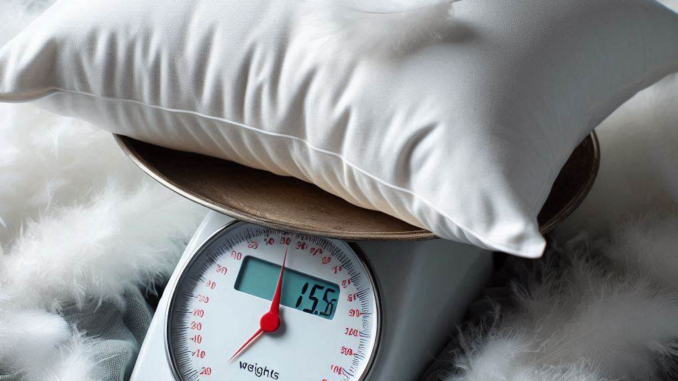
How Much Does a Pillow Weigh?
Ever wondered about the weight of that fluffy cloud you rest your head on each night? You’re not alone! The weight of a pillow might seem like a trivial matter, but it can actually make a big difference in your comfort and sleep quality. Let’s dive into this surprisingly interesting topic and uncover the secrets behind pillow weight.
Quick Answer: Most standard pillows weigh between 1 to 3 pounds, but this can vary greatly depending on size, fill material, and intended use.
My Pillow Weight Wake-Up Call
Before we get into the nitty-gritty, let me share a little story. Last summer, I decided to go on a camping trip with some friends. As the designated “overpacker” of the group, I thought I’d be smart and bring my favorite pillow from home. Big mistake! By the time I’d hiked to our campsite, my arms felt like they were about to fall off. That memory foam pillow I loved so much at home felt like a bag of bricks in my backpack.
This experience got me thinking – how much does a pillow actually weigh? And why does it matter? Let’s find out together!
Why Pillow Weight Matters
You might be wondering, “Why should I care about how much my pillow weighs?” Well, there are a few good reasons:
- Comfort: A pillow that’s too heavy can be hard to adjust during the night.
- Travel: Lightweight pillows are easier to pack and carry.
- Laundry: Heavier pillows can be more challenging to wash and dry.
- Neck Support: The weight of a pillow can affect how well it supports your neck and head.
Factors That Influence Pillow Weight

Several things can affect how much a pillow weighs. Let’s break them down:
1. Size
It’s pretty simple – bigger pillows tend to weigh more. Here’s a quick rundown of common pillow sizes:
- Standard (20″ x 26″)
- Queen (20″ x 30″)
- King (20″ x 36″)
- Body Pillow (20″ x 54″ or larger)
2. Fill Material
This is where things get really interesting. The stuff inside your pillow plays a huge role in how much it weighs. Let’s look at some common fill materials:
- Down: Light and fluffy, down pillows are usually the lightest option.
- Feather: A bit heavier than down, but still relatively light.
- Polyester: These synthetic pillows can vary in weight, but are often in the middle range.
- Memory Foam: Known for being on the heavier side.
- Latex: Natural latex pillows are often quite heavy.
3. Intended Use
Believe it or not, what a pillow is designed for can affect its weight:
- Sleeping Pillows: These come in various weights depending on fill and size.
- Decorative Pillows: Often lighter, as they’re not meant for sleeping.
- Travel Pillows: Usually very lightweight for easy packing.
- Pregnancy Pillows: These can be quite heavy due to their large size.
The Weigh-In: Average Pillow Weights
Now, let’s get to the numbers you’ve been waiting for! Here’s a handy table showing the average weights of different types of pillows:
| Pillow Type | Average Weight (lbs) |
|---|---|
| Down (Standard) | 0.8 – 1.5 |
| Feather (Standard) | 1.5 – 2.5 |
| Polyester (Standard) | 1 – 2 |
| Memory Foam (Standard) | 2.5 – 5 |
| Latex (Standard) | 3 – 6 |
| Travel Pillow | 0.5 – 1 |
| Body Pillow | 5 – 7 |
Keep in mind that these are just averages. The actual weight of your pillow might be different based on its specific size and construction.
The Pillow Weight Experiment
After my camping mishap, I decided to do a little experiment at home. I gathered all the pillows I could find and weighed them on my kitchen scale. Here’s what I discovered:
- My memory foam pillow (the camping culprit): 4.2 lbs
- My partner’s down pillow: 1.1 lbs
- Our couch throw pillow: 0.7 lbs
- My old polyester pillow from college: 1.8 lbs
This little experiment really opened my eyes to how much pillow weights can vary!
How Pillow Weight Affects Your Sleep
You might be wondering if the weight of your pillow really matters when it comes to getting a good night’s sleep. While personal preference plays a big role, there are some things to consider:
Support and Alignment
Heavier pillows, like memory foam, can provide more support for your head and neck. This can be great if you need extra help maintaining proper spinal alignment. However, if the pillow is too heavy, it might be hard to adjust during the night, potentially disrupting your sleep.
Temperature Regulation
Lighter pillows, such as those filled with down or polyester, often allow for better air circulation. This can help keep you cool during the night. Heavier pillows, especially memory foam, tend to retain more heat.
Durability
In general, heavier pillows tend to be more durable and hold their shape better over time. Lighter pillows might need to be replaced more often, but they’re usually easier to fluff and adjust.
Choosing the Right Pillow Weight for You
Now that you know all about pillow weights, how do you choose the right one for you? Here are some tips:
- Consider your sleeping position: Side sleepers often prefer heavier, firmer pillows, while stomach sleepers might do better with lighter options.
- Think about your strength and mobility: If you have any issues with arm strength or mobility, a lighter pillow might be easier to handle.
- Factor in your bed size: Larger beds can accommodate bigger, heavier pillows without feeling crowded.
- Don’t forget about travel: If you travel often, consider having a lightweight option for your trips.
Maintaining Your Pillow’s Weight
Did you know that pillows can actually gain weight over time? It’s true! As we sleep, our pillows collect dead skin cells, dust mites, and moisture, which can increase their weight. Here are some tips to keep your pillow at its optimal weight:
- Use a pillow protector to keep out dust and allergens
- Wash your pillows regularly (check the care label for instructions)
- Fluff your pillows daily to maintain their shape and distribute the fill
- Replace your pillows every 1-2 years, or when they start to feel too heavy or flat
The Future of Pillow Weight
As sleep technology advances, we’re seeing some interesting developments in the world of pillows. Some new pillows on the market feature adjustable weights or customizable fill amounts, allowing you to fine-tune the weight to your exact preferences. Who knows what the future holds? Maybe we’ll soon see smart pillows that automatically adjust their weight based on your sleep patterns!
Wrapping Up: The Weighty Matter of Pillows
Who knew there was so much to learn about pillow weight? From my camping misadventure to diving deep into the world of pillow materials and weights, it’s been quite a journey. Here’s what I hope you’ll take away from this exploration:
- Pillow weights can vary widely, from less than a pound to over 6 pounds.
- The weight of your pillow can affect your comfort, sleep quality, and even how easy it is to care for your pillow.
- There’s no one-size-fits-all answer – the right pillow weight for you depends on your personal needs and preferences.
Next time you’re shopping for a pillow, don’t be afraid to ask about its weight. And remember, it’s okay to be picky about your pillow – after all, you spend about a third of your life with your head resting on it!
Sweet dreams, and may you find the perfect pillow weight for your best night’s sleep!


Leave a Reply